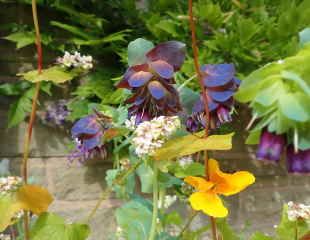
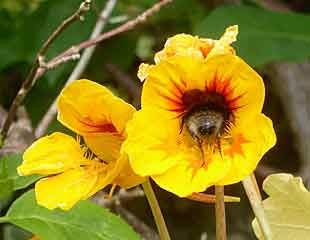
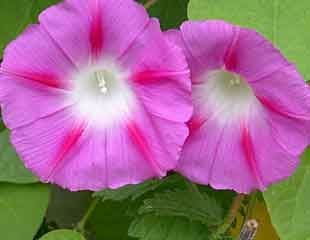
What are Annuals?
Annuals are plants which germinate, grow, flower, set seed and die all in one year. That means annuals do not come back the next year. Many genus of plant can have within the genus varieties which are both annual, possibly biennial and perennial.
Here, annual refers to those plants which are around for one year only, and that includes plants which are simply not hardy enough to survive our winters.
Why Grow Annuals?
You may wonder, if a plant is only going to last one summer, why bother to grow it in the first place?
The reason is that many of our most colourful plants are annual and add a lot of colour to our gardens. Many annuals are cheap and easy to grow from seed.
Common garden annuals are Nasturtium, Cornflower and many wildflowers and wildflower mixes, Ipomea, virtually all bedding plants, Calandula, Sweet peas,Nigella, Cosmos, Sunflowers it's a long list. From many of these plants you can collect seed at the end of the season and grow again next year.
Annuals are ideal for filling gaps in borders, the spaces where something didn't grow, or isn't as expected or as you are waiting for a border to mature. Some annuals, especially those which are half hardy, can be sown directly into the border. It is best to prepare the soil well beforehand. Whilst some annuals need rich soil, many do not, but all do best if the soil has been raked, so it is finer. Some annuals are better started in seed trays first, especially the more tender varieties. There is more growing information below.
Annuals are also cheap to fill borders for extra colour.
Top 10 tips on about growing from seed
If you have never tried growing flowers from seeds, or you fancy trying to grow annuals, here are some ideas. At the foot of the page are some more unusual annuals to grow.
The easiest annuals to grow from Seed.
Nasturtium
Nasturtium always germinates. It is a foolproof annual.
Nasturtium is a half-hardy annual. It will tolerate cold, but not a heavy frost and young plants are best planted out when the risk of serious frost has passed. You can sow indoors or direct into the border outside.
For indoor sowings any time from late Feb/March onwards, into ordinary compost which is pre misted, so it's a little damp. Keep warm in a conservatory, porch or window sill and make sure the tray does not dry out and they will sprout. They always do.
For outdoor sowings, leave until late April/May and sow where you want them to grow. Do not enrich the soil for Nasturtium, otherwise they grow lots of leaves and not enough flowers. Plant in a spot which gets sun for at least half the day.
Once you have purchased your first packets of Nasturtium seed, you can easily collect seeds as at the end of the growing season. You will find dozens of seeds on the Nasturtiums, pick them off, dry them well in a warm place and then into a paper bag to store over winter in a cool dark place, a fridge is ideal.
Calendula
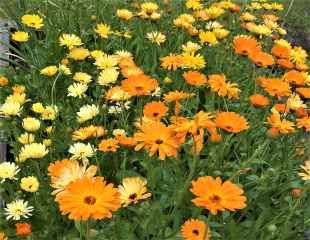
Calendula, the English Pot Marigold, will seed itself and start growing it is so easy. Again it produces lots of seed at the end of the growing season for use next year. It is also a half-hardy annual, sow and germinate in the same way as Nasturtium above.
Cornflower
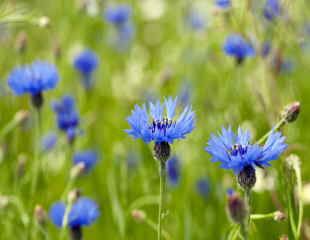
Cornflower and wildflower mixes are generally easy to sow and germinate, although the soil preparation is more tricky. You need to sow in April/Mail into a fine tilth with stones and lumps removed. Like other seeds, it is important to make sure the ground does not dry out.
Cerinthe Major

Cerinthe Major is an unusual but easy to germinate and grow, half-hardy annual.
So in the same way as the other half-hardy annuals and it has a very high percentage of germination. Plant in spot with at least half the day sunshine and it will reward you will lovely flowers, and bees.
Sweet Pea
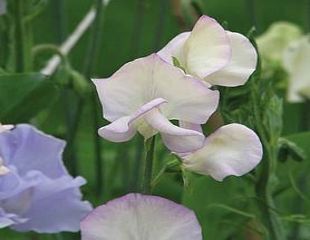
Sweet Peas are easy to germinate but are time-consuming to grow providing fabulous summer scent and colour. You can sow sweet peas in Autumn or Spring and they are hardy annuals, which means they will put up with mild frosts. You can sow in Autumn and overwinter under glass- all about growing sweet peas
Sunflower
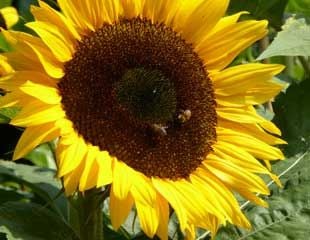
Sunflowers are a breeze to germinate from easy to handle, large seeds they are reliable germinators.
Sunflowers are also hardy annuals, which means you can start them off earlier in the year and they will tolerate temperatures to below freezing but not heavy frosts.
Cosmos
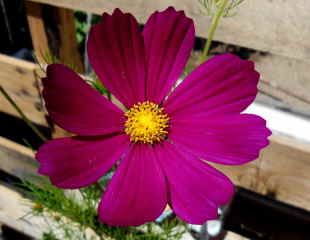
Cosmos flower in all shades of purple, maroon, cream pink white and are both half hardy and hardy. There are orange and yellow varieties and a tender chocolate coloured and scented variety. All are easy to grow from seed and reliable germinators.
Sow indoors under glass in a propagator and keep warm until seedling establishes.
Unusual annuals to grow
ipomoea
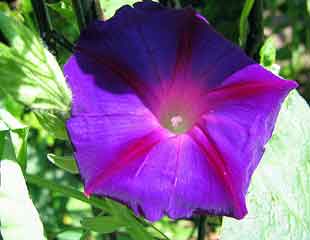
Ipomoea also known as morning glory, is a tender annual which, in the right conditions, produces a succession of large saucer type flowers all summer long.
The flower petals are attractive, almost velvety. It is a very tender annual and can be temperamental to grow in colder parts of the UK, but always worth a try.
Cobaea scandens
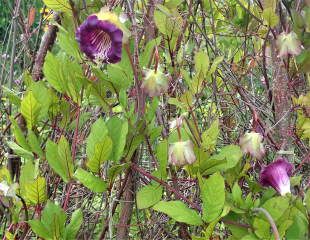
Cobaea scandens is also known as the cup and saucer plant. It is also a tender annual easily raised from seed. Whilst tolerant of temperature down to around 2 degrees, to do well, it needs to be planted in a warm sheltered position. For best results, germinate under-glass or indoors and plant out in warm conditions as a sturdy plant. I took the image photographed in at RHS Bridgewater, in the walled garden, which provided the shelter for it to thrive.
